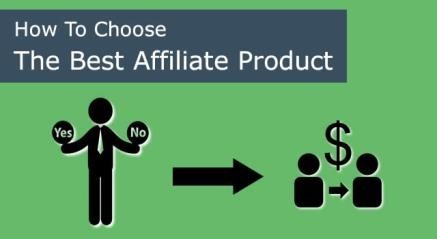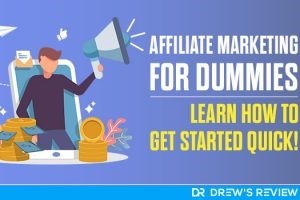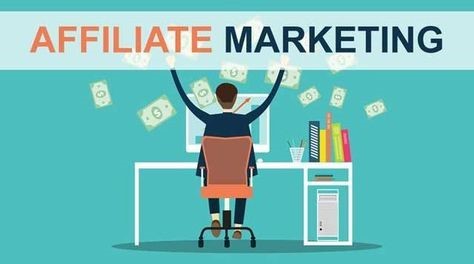How To Get Started With Affiliate Marketing Without A Website
That’s how I evaluate NEW projects. If I were going to start a brand new website from scratch right now around a space, I would go through that checklist. But listen. Very important. You MIGHT find ways to build affiliate programs into it indirectly. Let’s say you like geocaching. Remember that? It’s when you go out in the woods and cities with a GPS and find little treasure boxes that other people have left for you? Maybe that’s your thing. You use it to exercise a bit and unwind. You might think: well, then I’ll sell GPS products. Okay, but you can also sell backpacks, hiking boots, toys to stick in the boxes, snacks, thermoses, raincoats, umbrellas, and sunglasses. Bingo. Sunglasses are a HUGE internet product. Just check your spam if you don’t believe me. See? Some people also like to bounce topic ideas of the Google Keyword Planner tool. Sometimes that’s great, but if you are REALLY sure of your topic, don’t fret if that tool doesn’t back you up. I’ve made a career around creating my own keywords. You’ve got a topic, but you MUST determine of there are some affiliate programs that make it worth your time to build this out. (Again, provided your goal is to be an affiliate marketer and earn money promoting products and services that you vouch for to the people you have the pleasure to serve.) There are many affiliate platforms and programs out there. You want to seek out companies that have some level of longevity. You want to evaluate whether they have good reporting tools. You’ll probably want to Google any company you’re evaluating to make sure there aren’t too many scary stories about them, too. I’ll tell you off the bat that I am a very big fan of Share-a-Sale, because I know and trust their founder, Brian Littleton, and because a lot of the companies I’ve worked with have chosen Share-a-Sale for their platform. This isn’t a pure affiliate project, but IZEA is a company I appreciate and vouch for. I’m friends with founder Ted Murphy, and I’ve worked with this company since…2009, I think? There are sites like Commission Junction, Rakuten (formerly LinkShare), and tons more. There’s also Clickbank and even platforms like Amazon Associates. When you’ve decided on a company or companies to work with (many people have multiple affiliate accounts), it’s time to research your topic to see if there are some potential products and services in the area you’re hoping to develop. You can search by product name. You can search by company name. You can even just start typing stuff in and see what you find. Again, my big point (I’ve made it three or four times so far) is that you should only promote products and services that you’ve used or you can vouch for. Let that guide your searches, too. One little detail: sometimes, a company has a standalone affiliate program and for whatever reason, they opt to run the program themselves. That’s fine. It means you have to go to their site, apply for their program, and hope that they are as diligent and professional as the programs I’ve mentioned above. I’m not saying not to do it, but I tend to stick to platforms that I know will actually pay me for my efforts. At the TOP of that list for me is Share-A-Sale, so sign up there. Every affiliate manager (the person working with the companies selling the products and services) does their job differently. There are various ways they evaluate their affiliates, different ways they handle their relationships, etc. Some programs are open to anyone. You sign up and you’re in. Other programs require an application and verification. In those application-and-verification moments, the manager is looking for the following: What website will these links and banners be used? What else do you promote there? Are you legit or some evil spammer? Do you have any kind of an audience? Does your site even look nice? I can tell you from my own experience that I’ve been denied from programs because the manager felt I wasn’t the right fit. Fine by me. I’ve also been denied from programs because I wanted to use the links and banners on a site that wasn’t yet developed and the affiliate manager probably wanted to see me launch before giving me an account with their company. Never take the denials personally. Realize that you can reapply and just move forward. Focus on finding companies whose products and services you want to represent and work on getting approved for those. Sometimes, I know a product, but the company vending the product is unknown to me. For instance, I am an affiliate marketer for a vitamin supplement company that I know very little about, but I use them because they sell products that I can vouch for. So before I put a single link up from this company, I ordered products from them myself like a customer. I evaluated the delivery. I contacted their customer service to ask a question or two. I made sure I could trust these people with someone if I sent someone there to get a vitamin. (I recommend you do the same.) Okay, let’s say you’ve applied. You’ve been accepted. You’re ready to make a site. If you don’t already have a domain (URL) for your website, swing by Namecheap or whoever you prefer and buy one. With all the new domain options like .club and .media and so on, you’re likely going to be able to pick a decent name without much hassle. Some people prefer a name that matches a Google search like, “how-to-buy-a-car.com” or something. (Don’t search that because I didn’t.) My name choice is to create something memorable that you can own. When I dabbled with a nerdy site idea, I settled on NerdFront because I liked how bold it was. (Note: the project’s on hold AND it isn’t on StudioPress because I built it before that was an option.) Quick Disclosure: I have a strong bias for Brian Clark, Rainmaker Digital, and the StudioPress and Rainmaker platforms. My business runs on it and has for years. I will always recommend them because they’ve served me well for years now. That said, it’s important to build a site where you can do your affiliate stuff. You can build something simple, something mega complex, or you can build a media platform that handles blogging, podcasting,etc. I’ll give you three to choose from: I mentioned podcasting and video. You have a lot of options. I’ll tell you what I picked for various projects and you can choose your own adventure. For my last two podcast projects, I used and can highly recommend Libsyn (Liberated Syndication). They’ve been in business for years. I know the founders and many of the team there. A lot of the biggest podcasters in the world trust Libsyn. I’ve also dabbled with the podcasting tools inside Rainmaker. It works really well and I’m going to run my next podcast on it. The team at Rainmaker Digital all use it and have launched hundreds (thousands?) of episodes on it. I use YouTube and intend to use it more. I’ve started using Facebook and Facebook live. I believe there’s some “there” there. I also like those platforms like Vimeo and the rest. Don’t ask. Use what you want. But I think it’s a bit crazy if you don’t use the big mega platforms as well. You can argue with me. Pick for yourself. SUPER IMPORTANT STEP: On your About page on your website, create an area for disclosures. In the US, this is a legal requirement – see more HERE. Chris promotes and sells various 3rd party products and services via affiliate marketing links. These change frequently. Presume that most links here have an affiliate relationship attached, but also understand that if Chris promotes it, he uses and believes in the product or service. Let’s talk about making content. I mean blog posts. I mean newsletter articles (not just your blog posts sent in email). I mean podcast episodes. I mean videos. That’s the “stuff” of this job the way I do it. Reviews Guides How-to (oh! Like THIS post!) And sometimes just off-the-cuff stories where you find yourself talking about a product that you recommend. There are plenty of other ways to do affiliate marketing. These are content marketing plays, not the other stuff like coupon sites, etc. Above all else, I want you to be organic. Create information that will serve the person you’re hoping to help. Browse through what I’ve written at [chrisbrogan.com] and you’ll see there’s quite a mix there. My reader is a business person. My reader is someone looking for new ideas and perspectives. Thus, I can mention whatever makes sense in that context. But I also talk about products and services from my life where it makes sense. I love my Yeti mug. I love it. So when I talk about it, I link to where you can pick one up. Because if you get one, you’ll love it like I do. That’s how I do affiliate marketing content. It’s organic because the absolute goal of my efforts is to connect you with something I think you’ll find useful and/or will benefit you in some way. That’s my biggest message to you in this whole piece. The actual mechanics of how I post for affiliate marketing go exactly like this: I write my blog post. I identify links I want to place that point you to the product I want to reference. I find those links on ShareASale (or wherever you’ve chosen). I add those links to my post. * I publish the post. *There’s an extra step because I’ve chosen it. I use Bit.ly Pro as a link shortener. That means I take a link from somewhere like shareasale that looks like this: http://www.shareasale.com/r.cfm?b=518798&u=287419&m=46483&urllink=&afftrack= and turn it into this: http://cbrogan.me/namecheap. I recommend link shortening technology but it’s not VITAL. I do it for three reasons. 1.) Prettier links. 2.) More stats. 3.) I can replace a vendor with another vendor without upsetting the links I built on my blog and elsewhere. Like I said early on, you must also treat this like a business. And to do that, we move to our next step. If you’re not measuring your efforts, there’s no real reason to do affiliate marketing. The goal is to help others and to earn something for your efforts. To do this, you need stats. Look also for other tools to help with your efforts, too. For instance, I use Bit.ly pro for my link shortener. It tells me that my links have been clicked by people in 67 countries. It tells me that more people click my link for Rainmaker than they do my link for the Yeti mug this month. Your goal is to help others. You might find more information from your stat-gathering. For instance, let’s say Google Analytics says 100 people clicked a link on your page to a great set of art pens you like and promote. Your Bit.ly pro account confirms those 100 clicks, too. But your affiliate program says made zero sales. First, know that it could happen. People click but don’t buy all the time. 1% is a good number to aim for. 100 clicks, 1 sale. But if there’s no sale? The people who click might not like the product. – Should you find a new product? The people who click might not like the seller’s website. – Should you find a new vendor? There might be a disconnect in the content and the promoted link. Maybe lose the link and try something in a new post.
Do you want to manage the affiliate outreach in-house, or do you plan to higher an affiliate marketing management company to do that legwork instead?
Your job as an affiliate marketer is to be a solid and reliable bridge between product sellers and consumers.






